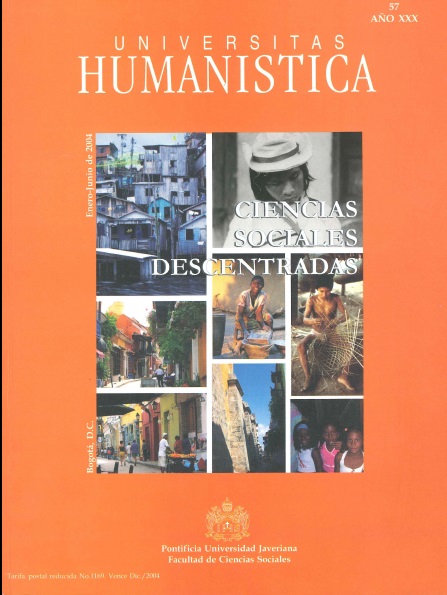Abstract
Este artículo explora el papel que asumieron los discursos geográficos en la construcción y elaboración cultural del territorio, la naturaleza y la población colombiana hacia mediados del siglo XIX. Además de exponer los motivos y condiciones que hicieron del conocimiento geográfico una herramienta fundamental de gobierno y dominación; el texto se ocupa de la manera cómo se construye la nación en las interpretaciones y descripciones del territorio y la naturaleza que aparecen en los textos geográficos que se publicaron en la época. Por último se hacen explícitos los vínculos entre las representaciones del territorio y, las concepciones de la población y el ciudadano construidas por las élites de la época.
This journal provides immediate open access to its content on the principle that making research freely available to the public, encourages greater global exchange of knowledge.
The journal Universitas Humanística is registered under a Creative Commons Attribution 4.0 International Public License. Thus, this work may be reproduced, distributed, and publicly shared in digital format, as long as the names of the authors and Pontificia Universidad Javeriana are acknowledged. Others are allowed to quote, adapt, transform, auto-archive, republish, and create based on this material, for any purpose (even commercial ones), provided the authorship is duly acknowledged, a link to the original work is provided, and it is specified if changes have been made. Pontificia Universidad Javeriana does not hold the rights of published works and the authors are solely responsible for the contents of their works; they keep the moral, intellectual, privacy, and publicity rights.
Approving the intervention of the work (review, copy-editing, translation, layout) and the following outreach, are granted through an use license and not through an assignment of rights. This means the journal and Pontificia Universidad Javeriana cannot be held responsible for any ethical malpractice by the authors. As a consequence of the protection granted by the use license, the journal is not required to publish recantations or modify information already published, unless the errata stems from the editorial management process. Publishing contents in this journal does not generate royalties for contributors.


